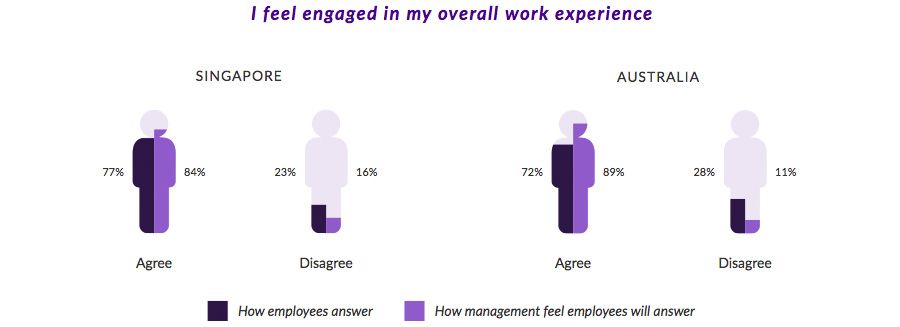[ad_1]
A new study commissioned by global software firm Achievers has shown the faltering engagement of employees who work from home – and a lack of awareness from higher ups.
Achievers Asia-Pacific commissioned Australian market intelligence company StollzNow Research to survey more than 1,500 employees across Australia and Singapore – to gain insight into how organizations in the region are faring in the new workplace over a year into paradigm.
Virtual work began as an emergency response in the early 2020s, although the benefits it has brought to employers (cost savings, etc.) and employees (flexibility, etc.) have prompted many to consider working from home permanently—at least for some. days of the week, which became known as the hybrid model.

This means that the main disadvantage of the virtual work model even last year was that employees felt isolated and disengaged, which contributed to a number of mental health problems and also affected the quality of work. The Achievers study looked at the engagement levels of organizations today and not much has improved.
Over 35% of employees in Australia feel less engaged when working from home – compared to less than 25% of employees who feel more engaged. The rest were ambivalent about the paradigm shift. The disconnect in Singapore was even higher: almost 50% feel less engaged compared to just 12% on the other side.
One explanation is the lack of facetime – as APAC managing director Matt Seadon of Melbourne-based Achievers put it. “Remote and hybrid work have been mainstays across the region for much of 2020, and one can theorize that the alignment between managers and employees has been entirely understandable due to the lack of face-to-face interactions.”

Not only has this affected the level of employee engagement, but it also seems to have put managers out of touch with their employees’ feelings – even in a conventional work environment. The researchers challenged both cohorts and found that it is clear that perception is not separate.
In Australia, 72% of employees feel engaged in their overall work experience (virtual and otherwise) – compared to almost 90% that management feels engaged. A similar (albeit smaller) difference is visible in Singapore – where 77% of employees actually feel engaged compared to 84% of managers.
While the perception of engagement varies from industry to industry, there is some level of mismatch in both markets. “Managers are misreading engagement levels across organizations at some pretty significant multipliers,” Seadon said.

“As a manager, you may think you’re doing a good job, but our research shows there’s a disconnect between what you think and what your employees feel.”
And this can have dire consequences: poor motivation, satisfaction and ultimately low productivity; to the lack of a coherent corporate culture and goals. The results range from minor absenteeism and a tense environment to critical business impacts on revenue and turnover.
According to Seadon, management needs to take control. “Disengagement validates the need to better measure engagement, improve employee voice, and gain real actionable insights about your team that you can recognize and reward appropriately.”
[ad_2]


